How Promises You Break Can Poison Your Child’s Life


The role of parents in their children’s school years is very important. Communication, respect, and accompaniment are some of the concepts every parent should keep in mind during these fundamental years to be able to really help bring up a responsible adult. As children grow into teens and future adults, both the good and bad habits learned at that earlier stage will start affecting them and shaping their character one way or another. Parenting in the past was not the same as it is today, so it’s important to adapt to new ways of doing things so that children can grow up with high self-esteem and confidence.
There are many expert tips for parents who have children at different stages of schooling, and Bright Side is illustrating them for you to see how good and bad parenting attitudes work on a day-to-day basis.

First of all, it’s essential to try and control your emotions when communicating with your children, especially if you’re addressing sensitive subjects such as education. There is no need to yell or argue, kids can understand just fine what you’re saying when you speak normally. Plus, you’re the adult, so you’re the one who has already learned to manage your temper. Kids are just learning how to do this. Talk to them calmly, ask them how they’re doing, what problems they had, and why they think things went the way they did. This type of respectful and direct communication will help avoid future problems and bring peace at home.
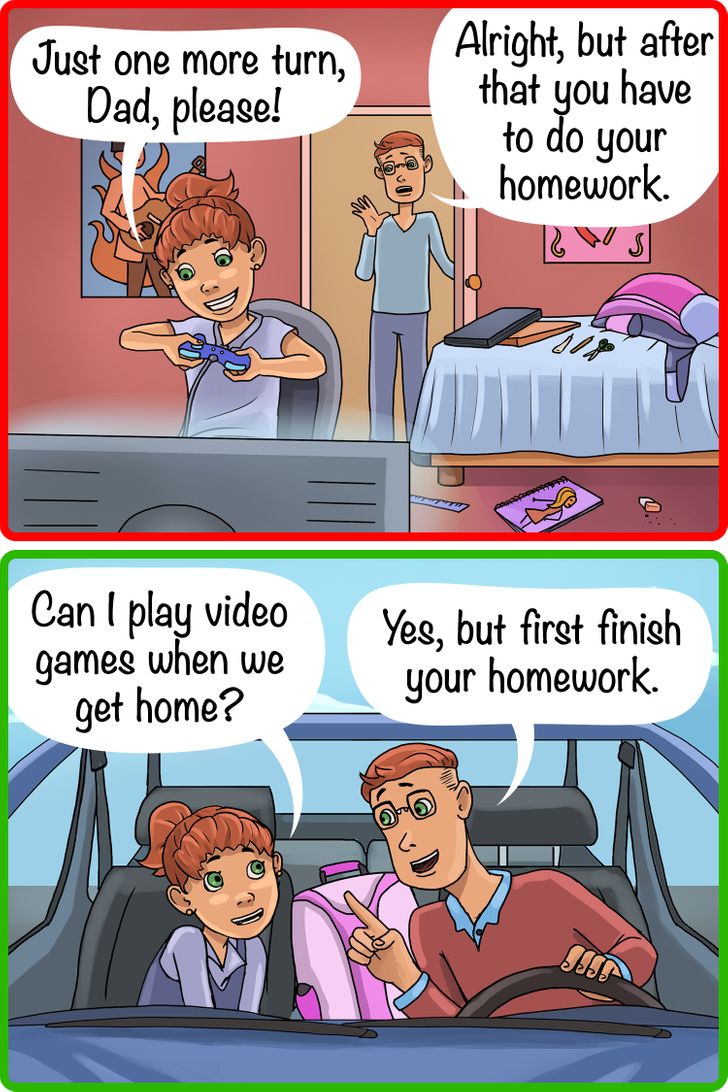
As a parent, you probably are aware that you represent a certain type of authority to your kids. However, being an authority is not the same as being authoritarian. You can set rules in place for your children in a pleasant way, accompanying them and giving them security instead of forcing your rules on them. Of course, there must be a clear time for responsibilities and for leisure. Remember, you should also try to be coherent and follow these rules over time so that your child understands that they make sense and see the results. If you’re convinced that these rules will work, your child will be too. If on top of that, they actually do work, then you’ll both have proof of it. If not, then you can change them and adapt to new situations as they come.
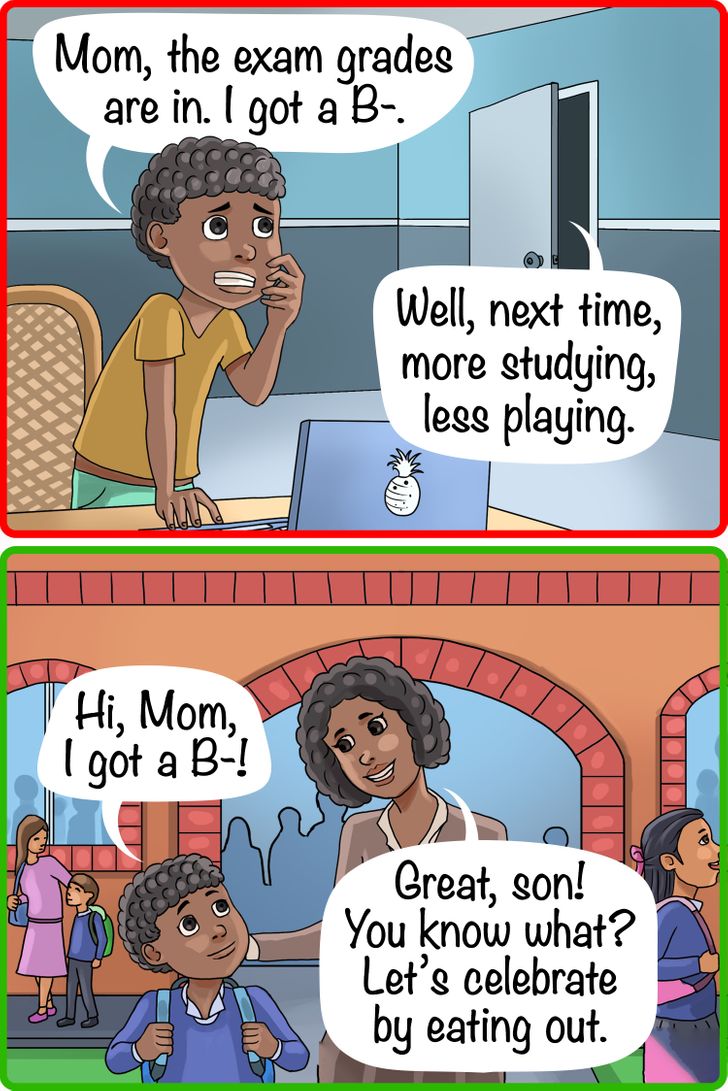
As a parent, you probably have certain expectations of your children. This is perfectly normal since you want the best for them. Maybe you want them to get straight As all the time, to become a doctor, or to go to Harvard. However, you have to be careful when communicating this to them. Always try to do it in a way that motivates them to progress and learn. For instance, when they get a good grade, even if it’s not the best grade, acknowledge it. Instead of giving them material things, such as buying new toys or video games, reward them by spending time with them. This way, they’ll grow up with confidence and high self-esteem, prepared for life’s challenges.

Getting to know the school your child attends is essential to understand what’s going in his or her life. You can start by identifying their school’s teaching and evaluation methods. Then try to find out what subjects your child has and what their ways of studying are. It’s also important that you try to go to all the parent meetings so you can talk to the people who educate your child every day. After all, your kids do spend a lot of time with teachers and other people from school. Now, with all this information, it will be easier to communicate in case there’s a problem.
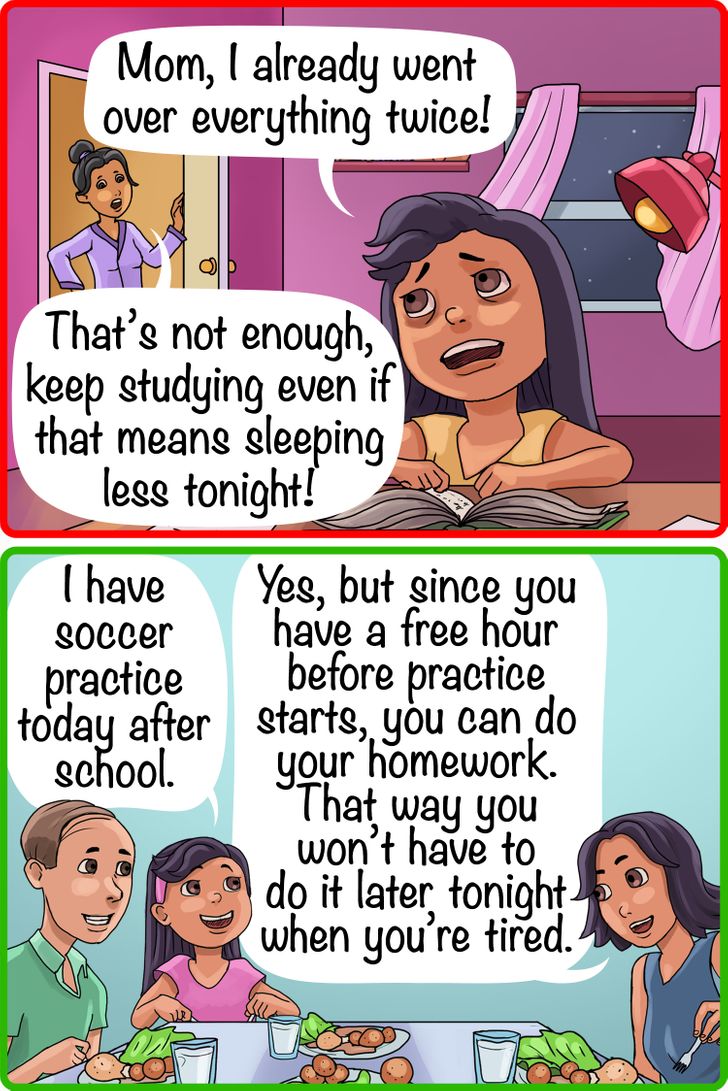
You can talk with your child to make sure that he or she finds a fixed time of the day to do their homework or to study. If possible, it should not be too late at night since both of you will be unmotivated and tired. It doesn’t make sense for these periods to be very long either because, just like your own work, kids can lose their attention and motivation after a while, meaning that they will just be wasting their time. That’s why it’s so important to be realistic. Resting is also extremely important. If everything is balanced, you and your kids will have fewer problems.
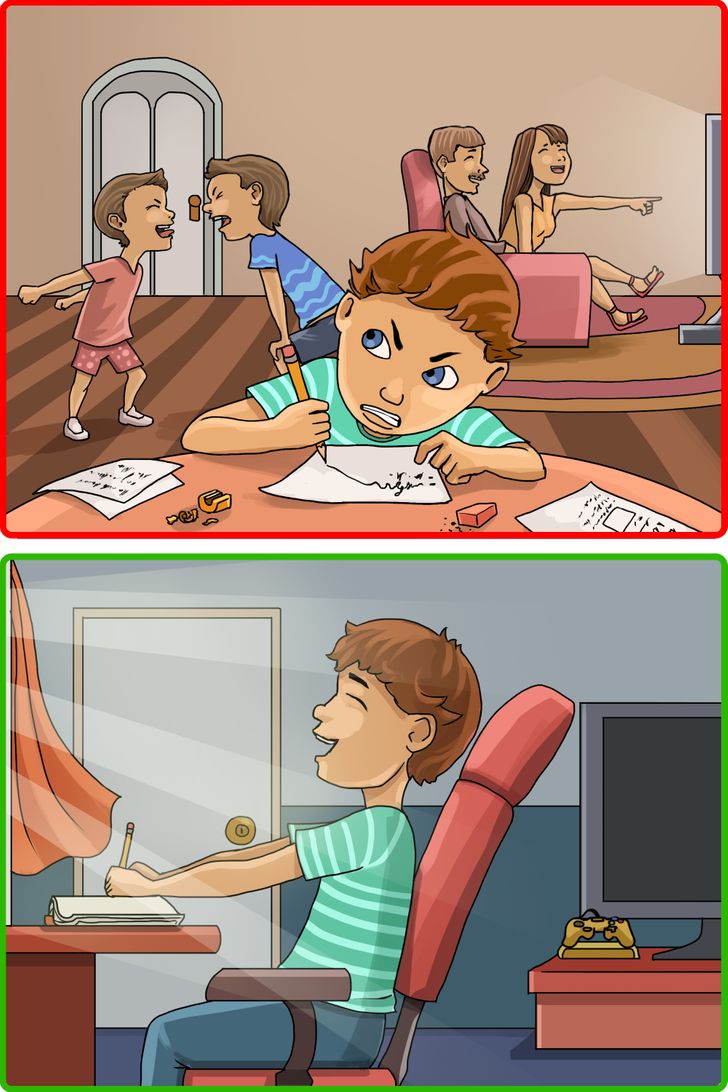
The conditions in which your kid studies and tries to focus are extremely important. Ideally, it should consist of a neat and clean table or desk. It’s often a good idea to have a special place at home or in your children’s room that’s entirely dedicated to that task. If distractions are out of the way, then that’s even better. The place should generate a desire to work and concentrate for your child.
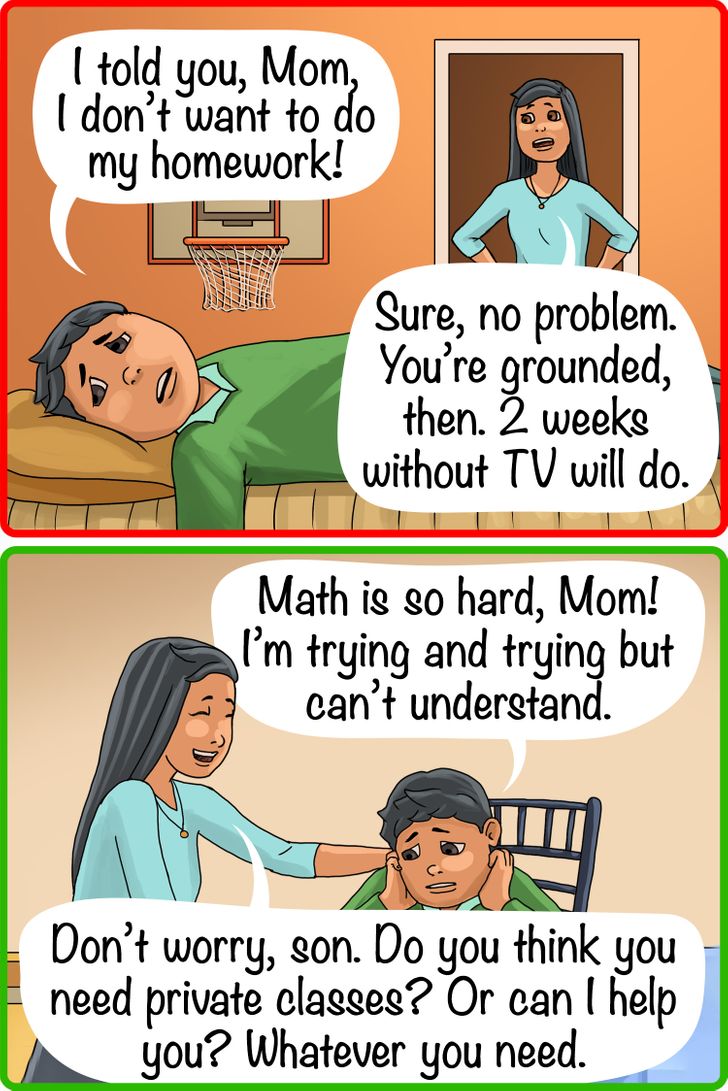
There may be days when your kids don’t want to do their homework, just like there are days when you don’t feel like going to work. In your child’s case, this feeling can be caused by different things, so you should always ask them why they don’t want to do their work, and from that conversation, you can draw your conclusions. Not wanting to do their homework is not the same as not having the ability to do it. It’s important that you try to understand them so that you can help them.
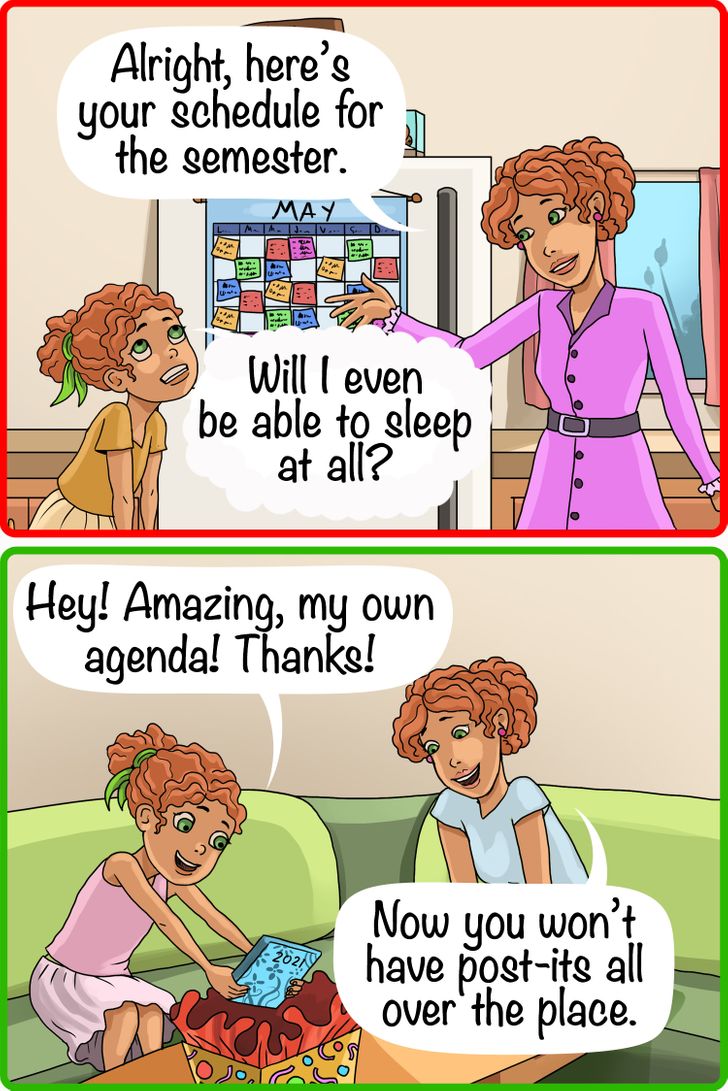
As your children grow up, their workload will increase and their responsibilities will also change. You’ll notice that, at some point, it will be very important to actively participate in your child’s planning and to teach him or her how to organize their time in a more efficient way. However, it’s often recommended for you not to intervene directly. It’s important that they have the freedom to plan their own agenda. After all, they alone are able to know at what time of the day they can do some tasks. A good tip is to provide them with materials to organize their time, such as agendas, calendars, and post-its, among other things.
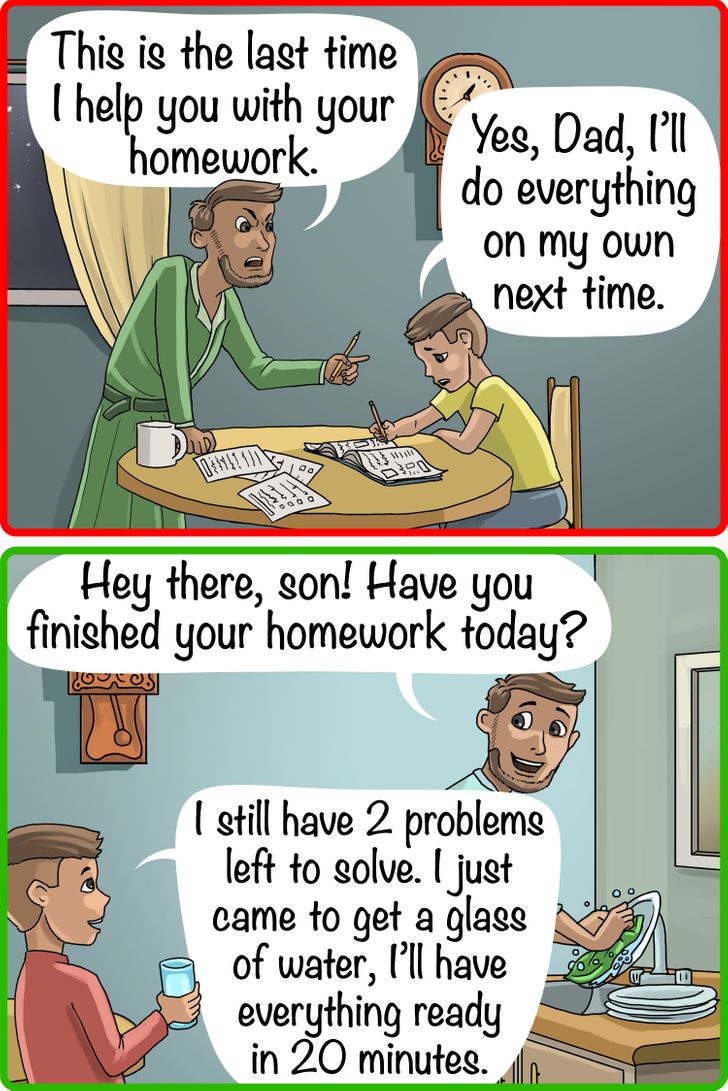
Supervising your kid when he or she is doing their homework is one thing, but doing their homework for them is something else. You, as a parent, are merely responsible for making sure your child has everything he or she needs to do their homework. You can accompany them or stay close by in case something comes up, but in the end, the person who has to solve these problems is your child, not you. If at some point, because the child is very tired or for whatever other reason, you agree to do their homework, you will be interfering in his or her learning process. Children should be able to do their homework on their own.

By letting your child plan and do his or her own chores, you are contributing to teaching them how to become independent and solve problems on their own. This doesn’t mean that you should totally disengage from their lives or anything of the sort. It’s just that you can witness their progress, acknowledge it, and motivate them to keep trying and getting better. For example, this can be done in the role you play in your child’s academic process. To motivate them, you can use language that encourages them and gives them enough strength to keep moving forward and discover what they like and what they’re good at.

Technology doesn’t have to be an issue if you know how to use it and teach your child to use it properly. After all, it’s the way we use it that makes it bad. As you probably know, these gizmos and gadgets can play an important role in the learning process. If your child’s cell phone or tablet brings them closer to educational content or academic applications that could help them solve problems, this is positive. Let’s not forget that technology offers them greater access to new knowledge and tools that could be useful later in life. Of course, this would not be the case if they were using these devices to play games or distract themselves. As an adult, you can supervise the appropriate use of these devices.

Both you and your child should make sure to prepare for rest when that time of the day comes. That’s why it’s often recommended not to engage in stressful activities or tasks in the evening. You can make use of these last hours of the day to chat, think of stories, read a book, or do any other activity that you can enjoy together that eases the transition to sleep.

Adults should set an example at home because children tend to imitate older people or figures of authority. If you’re responsible and fulfill your daily duties, you will inevitably be sending a similar message to your children. In addition to that, you can instill all kinds of good habits in them, such as reading or taking care of a pet. Always remember that it’s not what you say, but what your actions say about you that your child will look at.
How do you stimulate your children with their daily chores and activities? How did your parents act around you?











